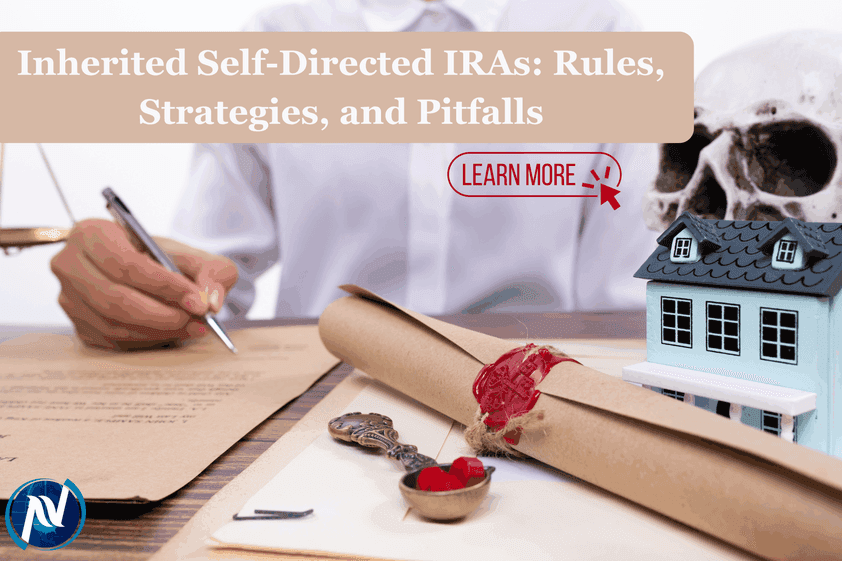Inherited Self-Directed IRAs: Rules, Strategies, and Pitfalls
Let’s be honest: No one gets excited about inheriting an IRA. It usually means someone you care about is no longer around. And just when you’re trying to navigate the emotions of this event, along comes a pile of paperwork and a tangle of IRS rules to deal with. Add the complexity of a Self-Directed …

Let’s be honest: No one gets excited about inheriting an IRA. It usually means someone you care about is no longer around. And just when you’re trying to navigate the emotions of this event, along comes a pile of paperwork and a tangle of IRS rules to deal with. Add the complexity of a Self-Directed IRA, and it’s no wonder people feel overwhelmed. But there is some good news. With a little clarity, some thoughtful strategy, and maybe a particularly strong cup of coffee or two, you can turn that inheritance into a meaningful part of your financial future.
What Happens When You Inherit a Self-Directed IRA?
First, a few basics. When you inherit a Self-Directed IRA, you don’t get to treat it exactly like your own retirement account. The IRS has special rules for inherited IRAs. How long can you keep the account? When do you have to take money out? How are the withdrawals taxed? Check with an accountant first. These rules can depend on a few things, like your relationship to the original account holder and the type of IRA (traditional or Roth).
You also inherit the assets inside the IRA. That might include real estate, private loans, or other alternative investments—things that aren’t always easy to sell or split. So instead of getting a neat cash balance, you might be looking at a rental property, a promissory note, or an ownership stake in a private company. This can be a real opportunity… or a real headache… depending on how prepared you are.
Strategy Matters—Even If You Didn’t Plan for It
The key to making the most of an inherited Self-Directed IRA is treating it like the long-term planning tool it still is. Sure, it came to you unexpectedly. But that doesn’t mean you have to cash it out immediately or make rushed decisions. In fact, the faster you move, the more likely you are to trip over one of the IRS’s many rules—and possibly trigger taxes you didn’t need to pay.
Some beneficiaries decide to distribute assets over a 10-year period, while others work with advisors to keep the account growing as long as possible. It all depends on your goals. Do you need income now? Are you hoping to grow the assets further? Are you comfortable managing real estate or other hands-on investments?
You don’t have to be an expert, but it helps to have one in your corner. Someone who knows Self-Directed IRAs can walk you through the logistics—like how to retitle assets, what deadlines you’re facing, and whether it makes sense to keep certain investments or sell them. They can also help you avoid some common missteps, like accidentally using the assets yourself (a big no-no) or missing a required distribution.
A Few Bumps to Watch For
Inherited Self-Directed IRAs aren’t always smooth sailing. If the account holds illiquid assets, you might run into trouble when it’s time to take required distributions. After all, you can’t slice off a piece of rental property to meet a withdrawal deadline. You may need to sell, refinance, or find creative ways to generate liquidity. This is where early planning can save a lot of stress later on.
There’s also the paperwork. Every custodian has their own process, and if you’re not familiar with Self-Directed IRAs, it can feel like learning a new language. The more proactive you are—asking questions, gathering documents, and checking timelines—the easier it becomes to keep the account compliant and moving in the right direction.
If you’ve inherited a Self-Directed IRA and aren’t sure where to begin, we’re here to help. Call American IRA at 866-7500-IRA and let us walk you through your options. Quirks, rules, and all.
Get 15 minutes of free expert advice.
If you're not sure whether a self-directed IRA is right for you, schedule a 15-minute call with our industry veteran team. We'll explain the possibilities, help you evaluate your options, and answer all your questions - no pressure, no obligations.
